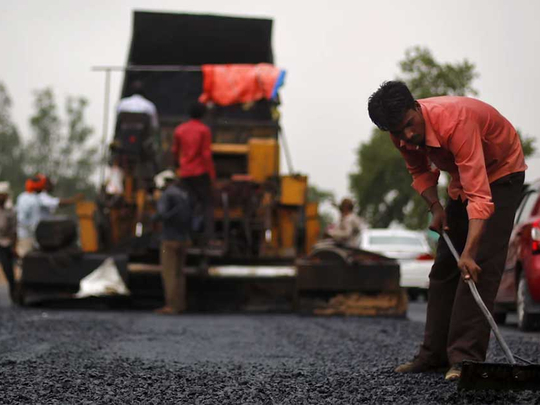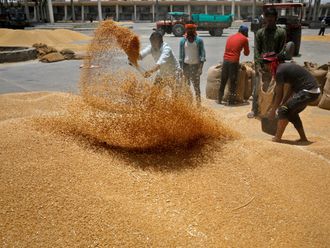
Dubai: Have you heard of plastic roads? Or do you know only pre-millennial, 20th-century road technology.
A new road building technique for the 21st century is advancing fast in India today.
More than 33,796 km of roads in India are plastic roads, according to a World Economic Forum report. A new report, however, states that the actual length of Indian roads using the innovative, home-grown technique runs for more than 100,000km as of October.
Using recycled plastic to build roads not only curbs pollution but also creates jobs, said experts. And there's more to it.
India's plastic roads made from recycled materials are not only greener, but are also stronger and maintenance-free — they could last about three times as long as conventional road structures, according to new research.
Under the government's massive plastic recycling programme, waste pickers collect plastic litter which are shredded in machines subsidised by the Indian government.
Then they sell it to road builders.
According to a World Economic Forum (WEF) report, plastic can make roads more durable against extreme weather — floods and extreme heat.
The Indian plastic roads solution is apart from a European road building technology using recycled plastic.
VolkerWessels, a construction services firm headquartered in Hollad, also wants to roll out plastic roads. Their idea involves recycling plastic waste into lightweight, prefabricated modules with hollow interiors that can be fitted with cables and plastic pipes and allow excess water to drain.
Because the pre-fabricated units will be easy to transport, assemble and maintain, and the lighter weight, it also means the ground will be less prone to subsidence. The firm believes that dues to it light weight and modular installation, the roads could be built to last three times longer.
Anne Koudstaal and Simon Jorritsma, inventors of PlasticRoad, said they expect to have a first prototype completed by year-end 2017.
How it works
Plastic waste — mostly water or soda bottles — are first sorted. After sorting, the material is cleaned, dried, and shredded.
The shredded plastic is mixed and melted at around 170°C. Hot bitumen is then added and mixed with the melted plastic.
After mixing the mixture is laid as one would with regular asphalt concrete.
Now, Indian's home-grown and affordable road technology that salvages plastic waste could be used in a massive road rebuilding underway, analysts said.
India has the world’s second-largest road network — but also one of the highest numbers of road accidents globally. Official data recorded more than 150,000 deaths from about 500,000 accidents last year.
Nearly a tenth of those deaths were caused by accidents involving potholes, which are a common feature of Indian roads.
In October, the Indian government announced an investment of 6.9 trillion rupees ($11 billion) to build 83,677km of roads over the next five years.
Home-grown, tested technology
Now, calls are growing for public works authorities to build roads with a tested technology using plastic waste, which reduces costs and makes roads more durable and thus safer.
“Plastic roads will not only withstand future monsoon damage but will also solve the problem of disposing of non-recyclable plastic,” said Isher Judge Ahluwalia, former head of a government committee on urban infrastructure.
Each kilometre of a single-lane tar road can consume one tonne of plastic waste, and the plastic can double or even triple the life of the road, said the economist in a paper published in October with Almitra Patel, a solid waste management expert.
India produces about 15,000 tonnes of plastic waste daily, of which about 9,000 tonnes is recycled.
The remainder clutters landfills and clogs drains, and is blamed for urban flooding.
Chemistry
A technology developed by Rajagopalan Vasudevan, a chemistry professor at Thiagarajar College of Engineering in the southern city of Madurai, uses finely-shredded plastic waste that is added to heated bitumen.
This mix is poured over stones.
The plastic waste can include anything from sweet wrappers to shopping bags. The mix cuts the quantity of bitumen required by 10 per cent, Vasudevan said.
He developed the technology in 2002 and first built a plastic road in his college before approaching state officials.
“We spend so much on building roads that develop potholes and need rebuilding in no time,” Vasudevan told the Thomson Reuters Foundation.
“The road I built is still intact — there are no potholes, no cracks. That is proof of its strength and durability, plus it uses waste plastic that otherwise litters streets and rivers.”
At least 11 states, including Vasudevan’s home state of Tamil Nadu, have used the technology to build more than 100,000km of roads, he said.
One student took the technology back to Bhutan.
Mandatory
In 2015, the Indian government made it mandatory to use waste plastic in building most highways.
But some states have been slow to embrace the technology, citing difficulties in segregating the plastic and bringing contractors on board.
The new infrastructure commitment gives fresh impetus, Vasudevan said.
“We are going to be generating waste plastic, and we are going to be building roads for the foreseeable future,” he said.
“Why not use the method that does away with plastic waste and makes the roads cheaper, durable and safer?”












